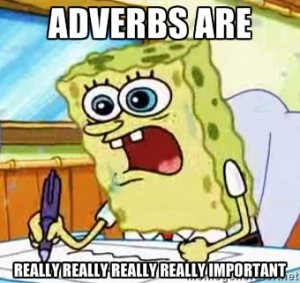When Adverbs Go Bad
When Adverbs Go Bad
Some people like to over-complicate things. They don’t subscribe to the “if it ain’t broke, don’t fix it” idiom. They have the unique ability to take even the simplest, most straightforward task or idea – and then surround it with unnecessary concerns.
Some writers operate in the same way. They feel the need to embellish and put in extra words where none are needed. More often than not, this does not reflect on their superior writing skills, but rather on the lack thereof. “The road to hell is paved with adverbs”, writes Stephen King in his book ‘On Writing – a memoir of the craft.’
“Alright, I’m sold! I shall never use an adverb again!” I hear you cry. Wait… come to think of it, just what exactly is an adverb? Glad you asked! An adverb is a word or a set of words used to modify verbs, adjectives, or other adverbs. An adverb is used to answer questions relating to how, when, where, or to what extent. Executed properly, and in the right amount, they can add a lot to a sentence: make a point when one is needed, emphasize actions, and define characteristics.
Now that we know all about adverbs, what you must beware of is using adverbs too often. There is no proper ratio or grammatical rule for the amount of adverbs. You could use as many as you wanted, technically. The thing is that by the end of your paragraph or text, you’d find your words buried under tons of unnecessary add-ons. Consider the following sentence:
Josh hacked away at the keyboard furiously, looked dryly at what he had written, and laughed copiously.
The action (hacked) already has enough of a punch in it to let us know that Josh is in some state. The word “furiously” here is superfluous. The words which came before that sentence even began – those should be enough to give us an idea of why and how Josh had been typing in such a fashion. This is also true to the rest of the sentence’s adverbs. Let us look at that very same sentence, without adverbs:
Josh hacked away at the keyboard, looked at what he had written, and laughed.
It is quite obvious that the second sentence is clearer and a lot less “busy” than the first one, and it is obvious why. While most people would never use three adverbs in a single sentence anyway, I merely used it to make a point: adverbs can go bad.

Most people believe that adverbs are really, really, really important.
Once, when I was a stage lighting designer for theater shows, a director wanted me to hang up all kinds of special lights and colors, in order to “highlight the performance”, as he put it. I reminded him that if the actors are good, their performance will already be highlighted by their own command of the craft and its possibilities. Lights and colors, I told him, are simply there to light up the stage, give a sense of atmosphere, and perhaps provide some insight into the scene. With adverbs, as with theater lights, sometimes less is more.
No comments yet.